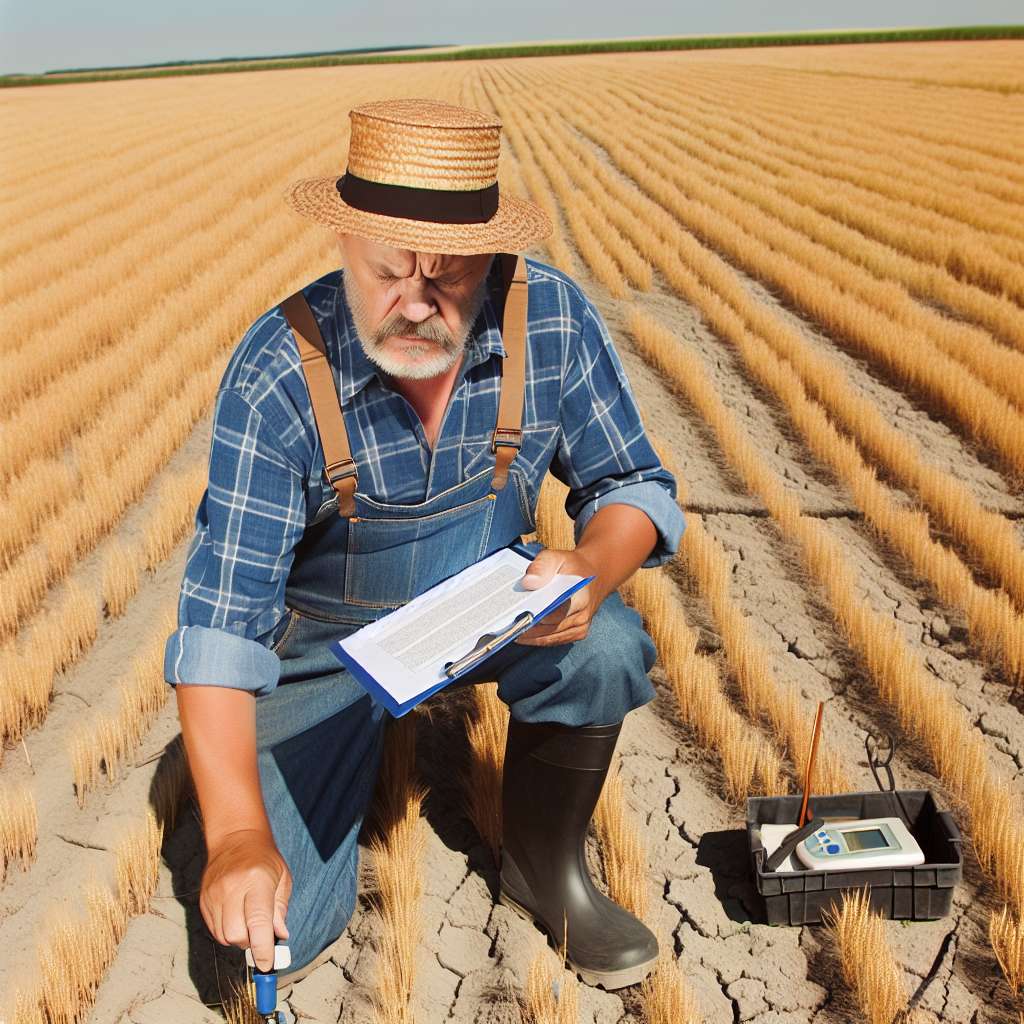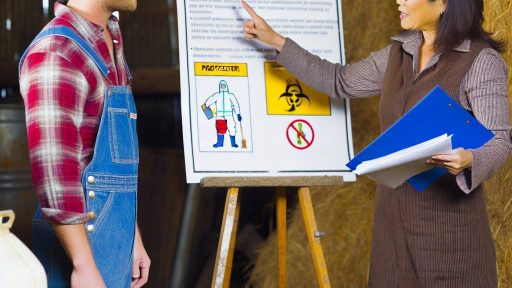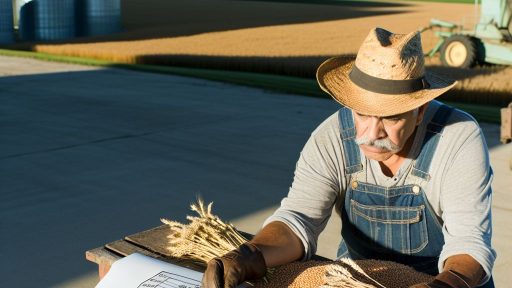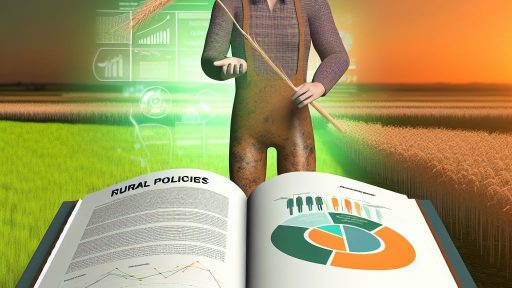Introduction to Sustainable Farming
Definition of Sustainable Farming
Sustainable farming refers to agricultural practices that maintain ecological balance.
It aims to produce food while preserving environmental quality.
This approach enhances biodiversity and supports soil health.
Farmers utilize methods that reduce pollution and conserve resources.
Importance of Sustainable Farming
Sustainable farming plays a critical role in addressing food security.
It meets the demands of a growing global population.
This practice reduces the dependency on chemical fertilizers and pesticides.
Moreover, it promotes healthier food systems for consumers.
Environmental Benefits
Sustainable farming practices help combat climate change.
They reduce greenhouse gas emissions through smarter resource management.
Additionally, these methods protect water quality by minimizing runoff.
Healthy soil is achieved by incorporating organic materials and crop rotations.
Economic Benefits
Implementing sustainable practices can lead to cost savings for farmers.
Reduced input costs arise from decreased reliance on synthetic chemicals.
This approach can create new market opportunities for organic products.
Transform Your Agribusiness
Unlock your farm's potential with expert advice tailored to your needs. Get actionable steps that drive real results.
Get StartedFurthermore, sustainable farming practices can enhance resilience to market fluctuations.
Community and Social Benefits
Sustainable farming supports local economies by creating jobs.
It fosters community connections through local food systems.
Moreover, it encourages educational initiatives about food production.
Communities gain from improved health outcomes due to local food availability.
Overview of Regulatory Compliance in Agriculture
Importance of Regulatory Compliance
Regulatory compliance plays a crucial role in sustainable farming practices.
It ensures that agricultural activities adhere to environmental laws.
This compliance helps maintain the quality of natural resources.
Additionally, it safeguards consumer health and safety.
Key Regulations in Agriculture
Numerous regulations govern agricultural practices globally.
The Food Safety Modernization Act focuses on preventing foodborne illnesses.
Furthermore, the Environmental Protection Agency oversees pesticide use.
These regulations promote safe and sustainable farming methods.
Standards for Sustainable Practices
Sustainable farming practices must follow specific standards.
The USDA Organic Certification sets guidelines for organic farming.
Moreover, the GlobalG.A.P. standard enhances food safety and quality.
Compliance with such standards boosts marketability for farmers.
Monitoring and Enforcement
Regulatory bodies continuously monitor agricultural compliance.
The USDA and state agencies conduct regular inspections.
Violations may result in fines or operational restrictions.
Therefore, farmers must stay informed about regulatory changes.
Benefits of Compliance
Adhering to regulations promotes environmental stewardship.
It also enhances public trust in agricultural products.
Moreover, compliance can lead to financial incentives and grants.
Showcase Your Farming Business
Publish your professional farming services profile on our blog for a one-time fee of $200 and reach a dedicated audience of farmers and agribusiness owners.
Publish Your ProfileUltimately, it contributes to sustainable agriculture’s long-term viability.
The Intersection of Sustainability and Compliance
Understanding Sustainable Farming
Sustainable farming practices benefit the environment and agricultural productivity.
These practices promote ecological balance and soil health.
They also help in conserving water and reducing carbon footprints.
Importance of Regulatory Compliance
Regulatory compliance ensures that farms adhere to environmental laws.
This compliance protects natural resources and promotes public health.
Additionally, it fosters transparency in farming operations.
Benefits of Merging Sustainability and Compliance
The fusion of sustainability and compliance offers numerous advantages.
It enhances marketability among environmentally conscious consumers.
Sustainable practices can also lead to cost savings over time.
Moreover, they increase resilience to climate change impacts.
Challenges of Integrating Sustainable Practices
Integrating sustainability into farming faces various challenges.
Initial costs of sustainable technologies can be high.
Farmers may also encounter a lack of technical knowledge.
Furthermore, navigating the complex regulatory landscape can be daunting.
Examples of Successful Integration
Farmers like Maria Santos have successfully integrated sustainability with compliance.
Maria’s farm employs crop rotation and organic fertilizers.
These methods not only comply with agricultural regulations but also enhance soil fertility.
Future Trends in Sustainable Farming
Future trends indicate a stronger emphasis on sustainability and compliance.
Technological advancements will likely facilitate this integration.
Innovation in agricultural practices will help meet regulatory standards.
Consequently, sustainable farming is poised for significant growth.
Learn More: Impact of Climate Legislation on Crop Production
Case Studies of Successful Sustainable Farming Practices
Innovative Crop Rotation in California
A family farm in California embraced innovative crop rotation techniques.
This practice enhanced soil fertility and reduced pest problems.
Moreover, the farm experienced a significant increase in crop yields.
By diversifying crops, they improved local biodiversity.
This approach also helped them to achieve compliance with environmental regulations.
Organic Poultry Farming in Texas
A Texan poultry farm adopted organic farming methods.
They prioritized animal welfare and reduced antibiotic use.
This farm’s healthy poultry led to greater market demand.
Additionally, they established relationships with local retailers.
As a result, they aligned with stringent organic certification standards.
Integrated Pest Management in Florida
In Florida, farmers implemented integrated pest management (IPM) strategies.
They combined biological, cultural, and chemical controls effectively.
This comprehensive strategy reduced pesticide reliance.
Consequently, farm profits increased due to lower input costs.
Farmers reported enhanced crop quality and safety as well.
Permaculture Practices in Oregon
An Oregon farm utilized permaculture techniques for sustainability.
This method emphasized working with nature’s patterns.
Showcase Your Farming Business
Publish your professional farming services profile on our blog for a one-time fee of $200 and reach a dedicated audience of farmers and agribusiness owners.
Publish Your ProfileThe farm created a resilient ecosystem that supported diverse crops.
They improved water conservation through natural landscaping features.
This commitment to sustainability attracted eco-conscious consumers.
Community-Supported Agriculture in New York
A New York City farm established a community-supported agriculture (CSA) program.
This initiative created a direct connection between farmers and consumers.
Members received weekly shares of fresh produce.
Additionally, it fostered community bonds around local food systems.
The program ensured the farm’s financial stability through pre-sales.
Uncover the Details: Comprehensive Guide to Securing Research and Development Funding for Farmers
Role of Technology in Ensuring Compliance with Sustainable Practices
Introduction to Technological Solutions
Technology plays a crucial role in sustainable farming.
Various innovations enable more effective compliance with regulations.
Moreover, they enhance the overall efficiency of farming practices.
Data Management Systems
Data management systems track essential farming metrics.
Farmers utilize these systems to monitor crop health and soil conditions.
Consequently, they can make informed decisions based on real-time data.
Remote Sensing Technologies
Remote sensing technologies provide valuable insights into land use.
Drones and satellites capture detailed images of farmland.
Farmers analyze this data to assess crop growth and environmental impact.
Monitoring and Reporting Tools
Monitoring tools simplify compliance reporting processes.
They help farmers document sustainable practices effortlessly.
Furthermore, these tools ensure adherence to regulatory standards.
Precision Agriculture Techniques
Precision agriculture optimizes resource use in farming.
Using sensors and automation, farmers apply inputs more effectively.
This practice reduces waste and promotes sustainability.
Blockchain for Transparency
Blockchain technology enhances transparency in the supply chain.
Farmers can track products from farm to table securely.
This traceability builds trust with consumers and regulators.
Collaboration Platforms
Collaboration platforms connect farmers with regulatory bodies.
These platforms facilitate information sharing and best practices.
Ultimately, they strengthen the compliance framework in agriculture.
The Future of Technology in Sustainable Farming
The future of farming incorporates advanced technologies for compliance.
Continued innovation will likely enhance sustainability efforts.
As a result, farmers will meet both regulatory and environmental goals.
Delve into the Subject: Enhancing Farming Operations with Rural Development Policies

Impact of Climate Change on Farming Regulations and Sustainability Efforts
Changing Regulatory Landscape
Climate change significantly alters farming regulations.
Governments are adjusting rules to address new environmental challenges.
These changes focus on mitigating environmental impact.
Compliance with these regulations is crucial for farmers today.
Farmers face increased scrutiny regarding their practices.
They must adopt sustainable methods to comply effectively.
Showcase Your Farming Business
Publish your professional farming services profile on our blog for a one-time fee of $200 and reach a dedicated audience of farmers and agribusiness owners.
Publish Your ProfileAdapting to New Standards
The transition to sustainable practices benefits both farmers and the environment.
New standards often include reductions in greenhouse gas emissions.
Farmers can implement practices like crop rotation and cover cropping.
These techniques enhance soil health and reduce chemical reliance.
Moreover, adapting to standards can improve market competitiveness.
Technological Advancements
Technological innovations play a vital role in sustainable farming.
Advanced precision farming techniques optimize resource use.
Drones and sensors help monitor crop health effectively.
Furthermore, artificial intelligence can predict climate impacts accurately.
These tools enable farmers to make informed decisions rapidly.
Collaborative Efforts for Sustainability
Collaboration among stakeholders enhances sustainability efforts.
Farmers, policymakers, and researchers must work together.
Information sharing leads to better practices and innovations.
Public-private partnerships can drive meaningful change.
Communities benefit from collective action toward sustainability.
Education and Training Initiatives
Education is essential for successful regulation compliance.
Training programs help farmers understand new regulations.
Workshops provide practical skills for implementing sustainable practices.
Continuing education fosters a culture of innovation among farmers.
Ultimately, informed farmers contribute to a sustainable agricultural future.
See Related Content: Rural Development Policy Insights for Today’s Farming Community
Government Programs and Incentives for Sustainable Farmers
Overview of Available Programs
Many government programs support sustainable farming practices.
These initiatives aim to promote environmental stewardship.
Farmers can access funding, education, and technical assistance.
Conservation Programs
The Natural Resources Conservation Service (NRCS) offers important resources.
Farmers can utilize the Environmental Quality Incentives Program (EQIP).
This program financially assists farmers adopting conservation practices.
Additionally, the Conservation Stewardship Program (CSP) rewards sustainable practices.
Financial Incentives
Various federal grants provide financial support for farmers.
The Sustainable Agriculture Research and Education (SARE) grants are notable.
These grants fund innovative projects that promote sustainability.
State-level programs also exist, offering tailored incentives.
Tax Benefits and Credits
Sustainable farmers may qualify for tax reductions or credits.
The federal government allows deductions for conservation expenses.
Local governments sometimes offer additional tax incentives.
Educational Resources and Workshops
Education plays a critical role in sustainable farming.
The USDA provides workshops and resources for farmers.
Farmers learn how to implement best practices effectively.
Many state universities also offer extension services.
Networking and Community Support
Farmers benefit from participating in local sustainable farming groups.
Showcase Your Farming Business
Publish your professional farming services profile on our blog for a one-time fee of $200 and reach a dedicated audience of farmers and agribusiness owners.
Publish Your ProfileThese networks provide collaboration and resource-sharing opportunities.
Community-supported agriculture programs also connect farmers with consumers.
Future Trends in Sustainable Farming Incentives
Government incentives for sustainable farming continue to evolve.
New policies may address climate change and biodiversity needs.
Innovative funding models are likely to emerge as well.
Farmers need to stay informed about these changes.
Future Trends in Sustainable Farming
Technological Advancements
Innovative technologies will shape sustainable farming practices.
Farmers will increasingly adopt precision agriculture.
This approach optimizes resource use and minimizes waste.
Additionally, automation will streamline planting and harvesting processes.
Blockchain technology may enhance supply chain transparency.
Regulatory Changes on the Horizon
Upcoming regulations will focus on environmental sustainability.
Governments will likely enforce stricter guidelines for pesticide usage.
Organic farming standards may also evolve to include new practices.
Furthermore, incentives for carbon sequestration will become common.
The Rise of Community-Based Initiatives
Community-supported agriculture will gain more traction.
Local food movements will promote regional sourcing of produce.
These initiatives will encourage consumer engagement and support.
Moreover, urban farming projects will expand in cities.
Consumer Preferences Shift
Consumer awareness about sustainability will continue to grow.
More individuals will demand ethically sourced products.
Consequently, farmers will adapt their practices accordingly.
Transparency in food production will become essential for brands.
International Collaboration and Standards
Global cooperation will be crucial for sustainable agriculture.
International guidelines may harmonize practices across countries.
This collaboration can enhance sustainability efforts worldwide.
Additionally, shared research initiatives can foster innovation.
Additional Resources
Regulatory and Other Agriculture Related Resources from Federal …




